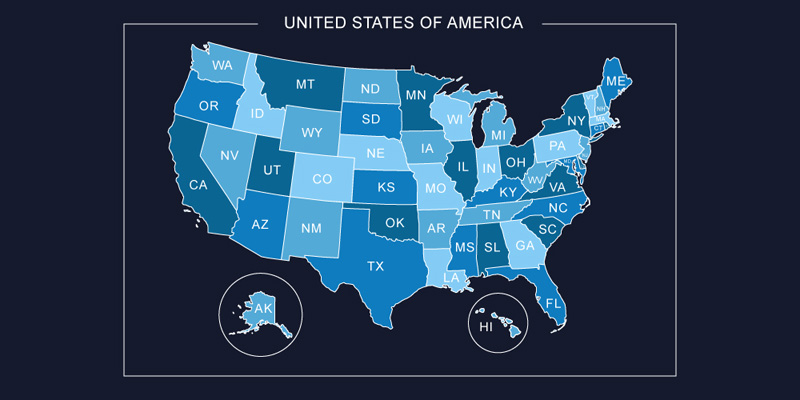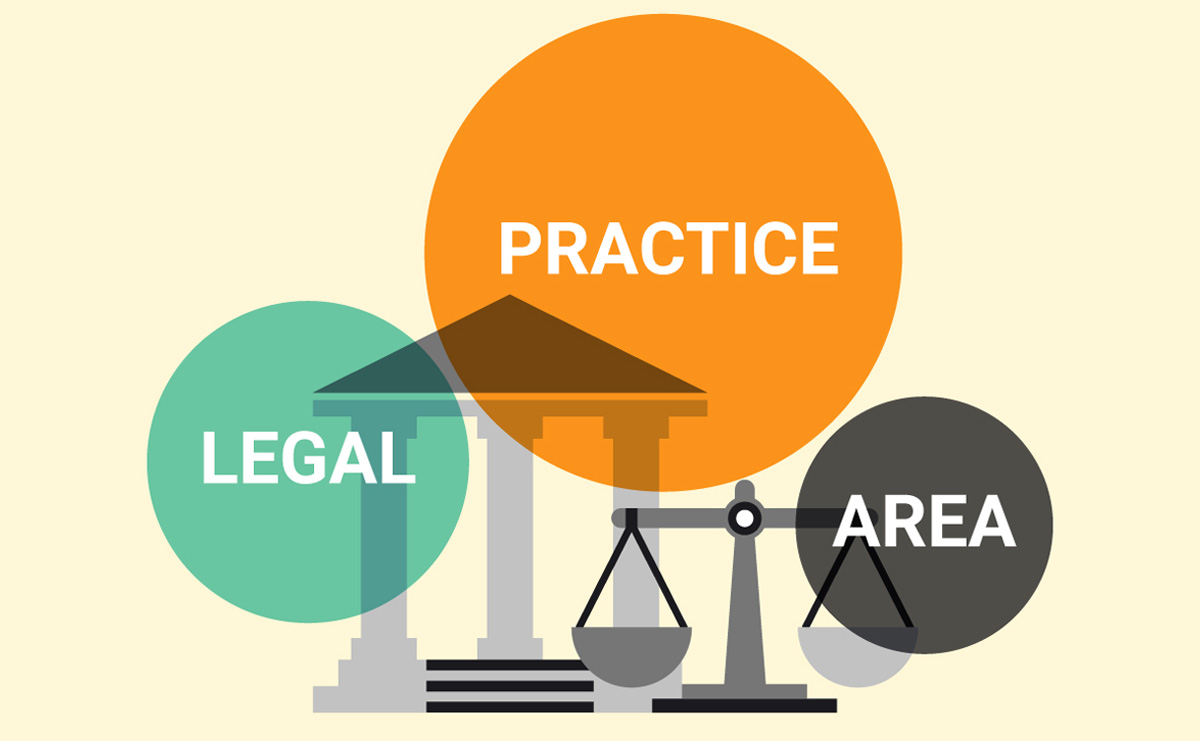Contents
Which States and Practice Areas Are Most Profitable for Small Law Firm in 2024?
When looking at the most profitable states and practice areas for law firms in the U.S., it is important to consider factors like client demand, the complexity of the cases, and the local economy. High-demand practice areas, such as personal injury, corporate law, and intellectual property, often generate significant revenue due to the volume of cases and the expertise required. Additionally, states with thriving business sectors or higher populations, like New York, California, and Texas, tend to offer more lucrative opportunities for law firms. In these regions, corporate transactions, real estate, and litigation are particularly profitable due to the high concentration of businesses, startups, and wealthy individuals. The legal landscape in these states also often involves more complex regulations, further driving the need for specialized legal services. Factors such as competition, local legal fees, and the cost of living can also impact a law firm’s profitability, making some states more favorable than others for building a high-revenue practice.
Most Profitable Practice Areas for Small Law Firms
Choosing the proper practice area in the ever-evolving legal industry can significantly impact a lawyer’s earning potential. Some areas of law, driven by high demand, complex regulations, and lucrative client bases, consistently offer substantial financial rewards. From corporate law to personal injury, these practice areas provide opportunities for law firms and individual practitioners to achieve long-term profitability and success. Understanding the most profitable practice areas allows aspiring and established attorneys to position themselves in competitive markets strategically, maximize their earnings, and build sustainable practices.
Estate Planning and Probate Law
With an aging population and increasing awareness around wealth transfer, estate planning offers consistent work, especially for small law firms. It also allows lawyers to build long-term client relationships. Estate planning encompasses a wide range of services, from drafting wills and trusts to navigating complex tax issues, ensuring assets are transferred smoothly across generations. Probate law, on the other hand, requires attorneys to assist with the administration of estates after an individual’s passing, often guiding families through legal and emotional complexities. This practice area offers the opportunity to establish trust with clients, which can lead to repeat business through referrals and multigenerational planning. Furthermore, estate disputes can arise as family dynamics evolve, offering additional litigation opportunities. As legislation around inheritance, tax codes, and elder law continues to shift, estate planning lawyers are also able to provide ongoing advice, keeping clients’ plans up to date and compliant with current regulations.
Family Law
Divorces, child custody, and prenuptial agreements are in high demand. Small law firms can carve out a niche in local communities with personalized services. Family law cases often involve sensitive and emotionally charged issues, such as spousal support, property division, and visitation rights, requiring attorneys to provide legal expertise, empathy, and strong communication skills. Small law firms can distinguish themselves from larger, less personalized practices by offering tailored, compassionate services. Additionally, family law attorneys can specialize further by focusing on specific areas like mediation or collaborative divorce, where couples seek amicable resolutions outside of court, offering an alternative to contentious litigation.
As family structures become more diverse, including blended families and same-sex marriages, the need for legal advice in these areas is growing. Attorneys in family law also deal with modifications of existing agreements, post-divorce disputes, and enforcement of court orders, creating ongoing work with long-term clients. Further, with the rise of international families and cross-border custody issues, family law is evolving, providing small law firms with opportunities to expand their expertise in global family law matters. Local connections, strong client relationships, and a deep understanding of community values allow small family law firms to build trust and become go-to resources for families in their regions.

Personal Injury Law
Personal injury remains profitable due to the high-value settlements and contingency fee structures, making it accessible even for smaller firms with limited upfront resources. In this practice area, attorneys typically work on a contingency fee basis, meaning they only get paid if they win or settle a case. This model allows smaller firms to take on significant cases without requiring clients to pay hefty fees upfront, broadening access to legal services and attracting a wide range of clients who might otherwise be unable to afford representation.
Personal injury law covers many cases, including car accidents, slip-and-fall incidents, medical malpractice, workplace injuries, and product liability claims. Each case offers the potential for substantial financial recovery for clients, leading to higher earnings for the law firm when successful. Additionally, the emotional and physical toll on injured clients often fosters deep gratitude when their lawyer secures a favorable outcome. This can lead to referrals and repeat business as clients recommend the firm to others needing legal assistance.
For small law firms, personal injury law also offers flexibility in building a practice. Attorneys can specialize in certain types of injuries, such as catastrophic injuries or specific types of accidents, allowing them to carve out a niche and stand out in a competitive market. This area of law also provides opportunities for creative litigation strategies, as each case requires a unique approach to investigating facts, negotiating settlements, or presenting arguments in court. Furthermore, as laws surrounding liability and compensation evolve, personal injury attorneys must stay current, ensuring ongoing growth and adaptation opportunities in this high-demand field.
Personal injury claims often settle before trial, making it a cost-effective practice area for smaller firms that may need more resources to sustain long, drawn-out court battles. With a mix of negotiation skills, legal expertise, and strong client relationships, small law firms can thrive in personal injury by providing diligent representation and achieving significant client outcomes.
Real Estate Law
Real Estate Law offers small law firms consistent opportunities in residential and commercial markets due to the ongoing nature of property transactions. Attorneys assist clients with drafting contracts, managing escrow, and resolving disputes. Small law firms can specialize in residential real estate—helping buyers, sellers, and landlords—or commercial real estate, focusing on complex transactions like leases and developments. Growing regions present additional prospects, particularly in areas with expanding infrastructure. Small law firms can build long-term client relationships and maintain steady business in this lucrative field by offering personalized service and staying current with legal trends.
Employment Law
Employment law offers small law firms versatile and profitable opportunities by serving both employers and employees. It covers various issues, such as workplace discrimination, wrongful termination, wage disputes, and labor compliance. For employers, small law firms guide contracts, workplace policies, and legal defense, helping businesses avoid costly disputes. On the employee side, firms represent individuals in cases of unfair treatment and ensure their rights are protected. The dynamic nature of employment law, influenced by trends like remote work and evolving regulations, creates ongoing opportunities for litigation and advisory services, making it a lucrative area for small law firms.
Intellectual Property (IP) Law
Intellectual Property (IP) law offers small law firms high-value cases driven by the rise of digital startups and creative industries needing protection for patents, trademarks, and copyrights. Firms can serve a wide range of clients, from tech companies to artists, by securing IP rights and handling infringement disputes. The field is lucrative, with opportunities for litigation, licensing, and international protection as businesses grow globally. As digital innovation and technology evolve, the demand for specialized IP legal services continues to increase, making it a profitable area for small law firms to establish long-term client relationships.
Business and Corporate Law for Small Businesses
Business and Corporate Law for small businesses is a lucrative niche for small law firm lawyers because many small companies need affordable legal services. These businesses require help with contracts, regulatory compliance, and disputes but often cannot afford large firms. Small law firm attorneys can offer personalized services like drafting contracts, ensuring compliance with laws, and handling disputes. They also assist with business formation, intellectual property protection, and long-term growth strategies. By providing tailored legal solutions, small law firms can build lasting relationships with their clients and become key advisors as the business grows, making this a profitable and steady practice area.
Immigration Law
Immigration law continues to be a vital practice area in 2024, offering numerous opportunities for small firm lawyers. With constantly evolving policies and regulations, individuals and businesses alike need legal guidance for a wide range of immigration-related matters.
Small law firms can focus on assisting clients with family-based immigration, employment visas, asylum cases, and citizenship applications. Given the complexities involved in these processes, the demand for knowledgeable immigration attorneys remains high. In states with large immigrant populations, such as California, Texas, New York, and Florida, small law firms have the chance to build a thriving practice by offering personalized services that cater to the specific needs of their communities.
Best States for Small Law Firms
For small firm lawyers seeking high returns from niche practice areas, certain states offer particularly favorable conditions. The best states combine strong economic growth, a supportive legal environment, and a demand for specialized legal services. Here are some standout states for small law firm lawyers with niche practices in 2024:
Texas: Texas, a top choice for small law firms specializing in energy, real estate, and corporate law, offers a promising future. The state’s robust economic growth and business-friendly regulations make it an ideal ground for lawyers in these areas. Moreover, Texas has a high demand for legal services in oil and gas, promising high returns for niche practices (ThinkAdvisor).
Florida: Renowned for its rapid population growth, Florida is a secure state for small law firm lawyers specializing in elder law, estate planning, and real estate law. The continuous influx of retirees ensures a steady demand for legal services in these areas (ThinkAdvisor).
California: With its booming tech sector, California provides strong opportunities for lawyers focusing on intellectual property, technology law, and entertainment law. These niche areas offer high returns due to the state’s concentration of startups and major tech companies (ThinkAdvisor).
Tennessee: In Tennessee, smaller firms focusing on healthcare law, manufacturing, and logistics find substantial demand. The state’s growing industries and regulatory environment create profitable opportunities for niche legal practices (Wikipedia)
Colorado: Colorado, with its significant rise in specialized practices tied to cannabis law, environmental law, and real estate, offers a confident environment. The state’s progressive legal frameworks and business climate support high returns for lawyers in these areas. (Wikipedia)(BEA)
Massachusetts: For lawyers specializing in biotechnology, healthcare, and education law, Massachusetts offers excellent returns. The state’s innovation-driven economy and leading educational institutions contribute to strong demand for niche legal services. (ThinkAdvisor)(Wikipedia)
How Legal Markets in Different States May Shift Profitability in Coming Years
Shifts in legal market profitability across different states in the coming years are likely to be influenced by several factors:
State-Specific Legislation and Regulation: Some states may adopt more business-friendly laws, attract corporate headquarters, or pass litigation reform, influencing profitability for specific practice areas like corporate law, regulatory compliance, and environmental law.
Economic Trends: States experiencing economic booms, particularly in industries such as tech, healthcare, or real estate, may see increased demand for legal services. This can boost profits for law firms specializing in transactional work, intellectual property, or regulatory issues.
Population Growth and Urbanization: Population shifts due to migration to states with lower costs of living or warmer climates could increase the need for legal services in family law, real estate, and personal injury cases. Sunbelt states (Florida, Texas, Arizona) are projected to grow, creating new opportunities.
Emerging Practice Areas: States leading in emerging industries such as renewable energy, cannabis legalization, or cryptocurrency regulations are expected to offer lucrative opportunities in those specialized legal markets. Lawyers who adapt to these industries will benefit from new legal needs.
Legal Technology Adoption: As legal tech grows in adoption, states, where law firms embrace automation, artificial intelligence, and legal practice management software like RunSensible, may see higher profitability due to efficiency gains. Legal markets in states like California and New York, which are already tech-savvy, might solidify their dominance.
Litigation Hotspots: States with more plaintiff-friendly jurisdictions, like California, might continue to see profitability in personal injury, class actions, and labor disputes, while others may shift toward regulatory and compliance law due to business growth.

Final Thoughts
The profitability of law firms across the U.S. is shaped by a combination of factors, including geographic location, practice area, and the evolving legal landscape. States with booming economies and specialized industries, such as New York, California, and Texas, provide ample opportunities for growth in corporate law, intellectual property, and real estate. Meanwhile, practice areas like personal injury, estate planning, and family law offer small law firms a chance to thrive by serving individual clients with high-demand legal needs.
As legal markets continue to shift with economic trends, legislation, and the adoption of technology, firms that remain adaptable and forward-thinking will be best positioned for long-term success. By strategically choosing their practice areas and locations, law firms can tap into lucrative markets, build strong client bases, and secure their place in the competitive legal industry. Whether through niche specialization or the use of innovative legal tools like RunSensible, law firms can optimize their profitability and ensure continued growth in the years to come.
Disclaimer: The content provided on this blog is for informational purposes only and does not constitute legal, financial, or professional advice.







